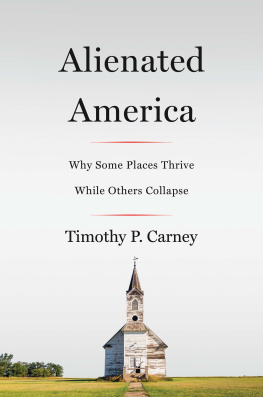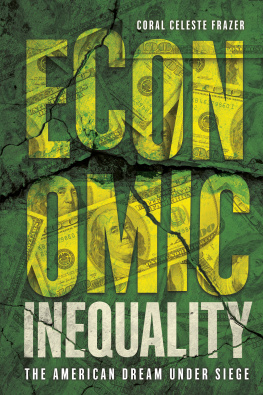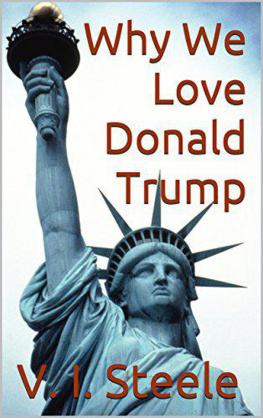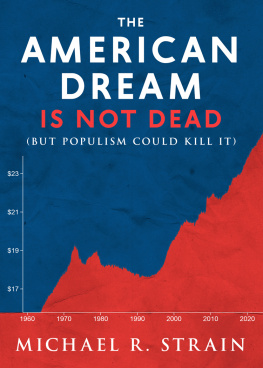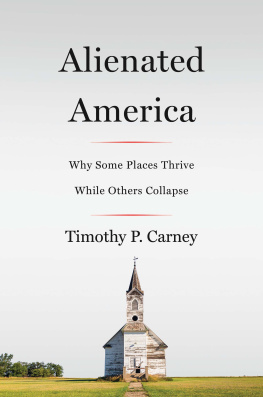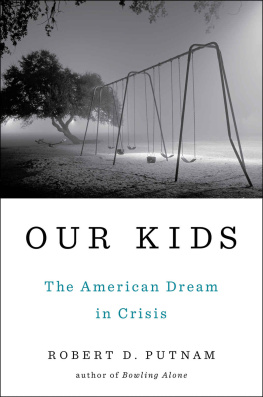Contents
Guide
Seek the well-being of the city to which I have carried you into exile. Pray to the Lord for it, for in its well-being will be your well-being.
JEREMIAH 29:7
W e could start a book about the death of the American Dream in a million different places. We could start in Smittys Bar and Restaurant in a dead steel town outside Pittsburgh, or we could start in the Bishops Storehouse in Salt Lake City. We could go to Iowa and start in Glory Days Sports Bar in Council Bluffs, or at a Christian college in Sioux Center. We could start at the shuttered Methodist churches in rural Iowa or the bustling basement of the Islamic Center of Greater Toledo. We could start standing in line at a Trump rally or camping out at Occupy Wall Street.
We will get to all those places on this journey, but we will start the story in the Pediatric Intensive Care Unit of Childrens National Hospital in Washington, D.C.
It was about four a.m. I had just gotten two hours of decent sleep, relatively speaking, sitting in a spartan armchair, my head leaning against the metal bars of the PICU crib. My daughter Eve, eleven months old, was the patient, and she slept soundly, despite the prongs of the nasal cannula up her nostrils, the pulseoxygen saturation monitor taped to her toe, the three electric wires stuck to her chest and back, and the fact that she couldnt really breathe.
The breathing was done by a machine next to her crib that slowly won my awe.
Infected with a respiratory virus, Eves alveoli were too clogged with mucus for her to get sufficient oxygen into her lungs. The local urgent care center I had sprinted to (with her in a jogging stroller) couldnt get her enough oxygen. My wife rode in the ambulance with Eve to Holy Cross Hospital, where Eve had been born and where our kids had made many emergency room visits. Holy Crosss oxygen pumps also couldnt get enough into her lungs. She was getting paler by the minute.
However, the PICU at Childrens had this magic high-powered machine, which could pump up to five times as much oxygen into her lungs as the ordinary wall oxygen hospitals normally rely on. That machine, along with an unerringly excellent nursing staff, was saving my daughters life.
At four a.m., though, that machine and the PICU nurses had to share my attention and gratitude. My thoughts were filled in that hour with the help we were getting from friends and neighbors during our stay, which would stretch from Sunday to Thursday.
My colleagues on the opinion page at the Washington Examiner had barbecue (my favorite) delivered to me for lunch on Monday. One colleague delivered beer and dark chocolate to the PICU to make the stay more bearable for my wife, Katie, and me. One friend in Virginia had so much food delivered to our house from the Corner Bakerysandwiches, salads, chips, cold cutsthat we ate dinner and lunch from the platter for more than a week. Americas Future Foundation, an organization of young conservatives and libertarians on whose board I had served for years, sent a gift card for ordering dinner from GrubHub (a food delivery service) for our whole family.
My mother-in-law brought a chicken potpie to our house for dinner one night. She also repeatedly came to watch the kids while my wife or I drove to the hospital to trade off shifts with Eve. Katies younger sister and her husband also sat a shift with our kids, as did other friends in our parish, and another neighbor.
With us unable to fulfill our carpool duties, the other parents took on extra trips, and even went out of their way to pick up our son.
We got so many offers of help or food that I felt guilty about my inability to field them all. My cup runneth over, was the Bible verse that crossed my mind.
In the moment, waking up at four a.m. with a sore neck in the tiny curtained booth of the PICU, I had an image of a swarm of friends, family, and neighbors rallying to our aid. But as I considered it more during our stay, I saw in greater detail the contours of this support we were enjoying.
As I thought about each person or couple who helped us, or wrote, or called, I noticed these werent simple bilateral relationships. In almost every case, there was an institution that linked us. Again, this wasnt how we thought about our friends generallythey were just our friends.
But whenever I described to others the help we got, I found myself speaking of the couple from our parish, or the family from our pool. Some help came from parents at the same boys school where our oldest sons go. Others were my college classmates. Others were my work colleagues at the Examiner or the American Enterprise Institute. Parents of the kids I had coached in baseball helped. The woman who sent the Corner Bakery feast is in my wifes book club and attends the same Virginia parish as my wifes parents. The GrubHub gift card, again, came from an organization whose board I had sat on.
Our dense and broad network of friends, which had become a short-term safety net, wasnt merely a network of friends. It was a network of organizations, companies, churches, schools, and clubs. The hubs that bound us to these friends are what we call institutions of civil society. Sociologists might say that during those five days, we were drawing on our deep reserves of social capital.
My favorite moment to reflect came on Sunday, as I was sprinting down Georgia Avenue with a blue-lipped lethargic Eve in a jogging stroller. Katie had gone to a late-morning Mass at our parish with our oldest daughter. When she finally looked at her phone and ran out of Mass to meet me at the urgent care center, she turned to Lucy and said, Go sit with Dorrie, pointing to the mother of an old school friend. Shell give you a ride home after Mass. If not, someone else will.
Katie simply knew that we could count on our parishon the people in that communityto help. That knowledge, the certainty that someone can help you when you need it, was always there, but we hadnt noticed it until we needed it. Like the health insurance that paid most of the bill, the insurance of the social networks had provided great peace of mind without ever rising to the front of our consciousness.
In short, we always took for granted the social capital we possessed, and the dense, expansive networks of civil society in which we were entangled. Why? Because this was how we both grew up.
If you belong to a church, youve probably experienced something like it, on either the giving end or the receiving end, or both.
Alternatively, if you are college educated and married, even if you dont belong to a church, you probably have many ties to civil society institutionsswim clubs, PTAs, workplaces, book clubsthat provide this sort of infrastructure of friends and associates.
Dense social networks may not seem remarkable to you, the reader, for the same reason water doesnt seem remarkable to a fish. [N]etworking power is like the air we breatheso pervasive its easy to miss, author J. D. Vance wrote when he finished law school and joined the elite.
Vance noticed the networks, though, when he was at law school. It was a shocking realization for him that personal connections, typically through institutions of civil society, were central to the success of the elites. Growing up in a broken family in a working-class suburb, Vance hadnt had those networks. It wasnt so much that people in working-class towns had less powerful connections; it was that every family was less connectedto anyone. His Middletown, Ohio, was a place of alienation.
Hillbilly Elegy, Vances memoir, became a bestseller in 2016 because it offered insight into a part of the country that the educated and affluent had missedthe dark, broken places in working-class Middle America. What generated the interest in working-class white Middle America?

